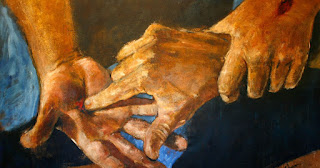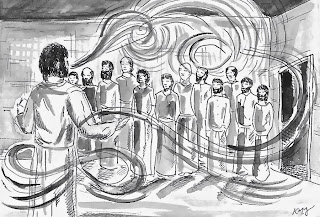It is a beautifully crafted story. There are so many carefully included details – the mention of a charcoal fire (21:9), reminiscent of the one Peter warmed his hands around as he was denying that he knew Jesus (18:18); the exact number of fish that have, yet again, been miraculously caught (21:11); the fact that Peter is so excited by seeing the figure of Jesus on the shore that he jumps straight into the water and swims to meet his friend instead of waiting until the boat has been rowed back to land. (21:7)
But my favourite moment – and perhaps one of my favourite moments in all of scripture – is Jesus simply saying, “Come and have breakfast.” (21:21) When you think about it, it is the most astounding thing for God to say. It is so utterly normal. So mundane. And yet, it is an action filled with love, compassion and a profound understanding of what is actually going to help Jesus’ confounded and terrified friends in that moment: they need some grub.
This story reminds me of another moment in scripture where God focuses on the basic bodily needs of his people rather than attending to deeper, spiritual matters. Those can wait. The story is that of Elijah underneath the broom bush (1 Kings 19) Elijah is having a bad day: Jezebel, the tyrannous wife of the king, wants him dead and he has fled from her clutches into the midst of the desert. He is physically exhausted and emotionally at breaking point. So low are his spirits in fact that he asks God to take his life from him because he cannot see the point in living anymore. He collapses underneath a nearby bush and falls asleep.
And what is the very first thing that God does for him? God does not try to talk him out of it. He does not try to give him some kind of profound theological framework for understanding what is going on. He doesn’t pull him up by his boot straps and tell him to get on with it. God knows, although we are often quick to forget, that what is most needed when someone is in crisis and in deep pain is precisely not trite words or reassurances. And so, God sends an angel to give him some breakfast instead:
“All at once an angel touched him and said, “Get up and eat.” He looked around, and there by his head was some bread baked over hot coals, and a jar of water. He ate and drank and then lay down again.” (1 Kings 19:5-6)
I wonder what the modern day equivalent of making someone breakfast is….
One of the hardest things about our current situation is the helplessness that most of us feel. We cannot comfort those that need to be comforted – or at least not in the ways that we would want to; we cannot be with those that we love; we cannot hold people’s hands and sit together quietly on the sofa and say nothing at all . But the simplicity of Jesus’ action with his friends has got me thinking about what we can do.
This week, I have been feeling a little glum and praying for encouragement and it has come in three beautifully simple ways. One Monday, a friend dropped round cake, chocolate and wine; on Wednesday a friend sent the loveliest and kindest text message; and then this morning we received two storybooks in the post for our girls from Sarah’s godmother.
I’m sure that none of those doing these acts thought that they were particularly special or that they would make much of a difference, but the impact on my week has been profound. And it has encouraged me to think more creatively about what it means to support others during this pandemic. Perhaps we cannot meet the deepest needs of our friends, but Jesus didn’t start with that either. He started with something simple: he cooked them breakfast.




